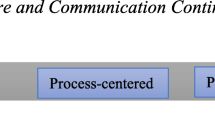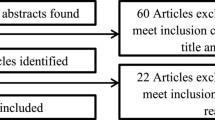Abstract
This research examines the processes by which patient self-management interventions are related to symptom responses among cancer patients. A total of 333 patients from two randomized clinical trials were combined. Each patient received a six-contact 8-week patient self-management intervention delivered by a nurse to address symptoms. Nurses’ decisions to deliver the strategies, patient enactment of strategies, and their success were investigated using patient- and symptom-level characteristics. Generalized estimating equation modeling accounted for clustering of symptoms and strategies delivered for each symptom within patient. Patient self-management intervention strategies were classified into four classes. Strategies were delivered by nurses for symptoms with higher interference and longer duration. Patient and symptom factors were related to enactment strategies. Symptom responses were related to number of strategies tried by patients. Delivery and enactment of strategies were related to both patient and symptom characteristics.


Similar content being viewed by others
References
Clark NM. Management of chronic disease by patients. Annu Rev Public Health. 2003; 24: 289–313.
Barlow J, Wright C, Sheasby J, Turner A, Hainsworth J. Self-management approaches for people with chronic conditions: A review. Patient Educ Couns. 2002; 48: 177–187.
Corbin JM, Strauss A. A nursing model for chronic illness management based upon the Trajectory Framework. Sch Inq Nurs Pract. 1991; 5: 155–174.
Lorig K, Holman HR, Sobel D, Laurent D, Gonzalez V, Minor M. Living a Healthy Life with Chronic Conditions. 2nd ed. Boulder: Bull Publishing; 2000.
Glasgow RE, Osteen VL. Evaluating diabetes education. Are we measuring the most important outcomes? Diabetes Care. 1992; 15: 1423–1432.
Orem DE. The utility of self-care theory as a theoretical basis for self-neglect. J Adv Nurs. 2001; 34: 552–553.
Clark NM. Asthma self-management education. Research and implications for clinical practice. Chest. 1989; 95: 1110–1113.
Chodosh J, Morton SC, Mojica W, et al. Meta-analysis: Chronic disease self-management programs for older adults. Ann Intern Med. 2005; 143: 427–438.
Newman S, Steed L, Mulligan K. Self-management interventions for chronic illness. Lancet. 2004; 364: 1523–1537.
Adler NE, Page AE, eds. Cancer Care for the Whole Patient. Washington: National Academic Press; 2008.
Butler AC, Chapman JE, Forman EM, Beck AT. The empirical status of cognitive behavioral therapy: A review of meta-analysis. Clin Psychol Rev. 2006; 26: 17–31.
Conn VS, Hafdahl AR, LeMaster JW, Ruppar TM, Cochran JE, Nielsen PJ. Meta-analysis of health behavior change interventions in type 1 diabetes. Am J Health Behav. 2008; 32: 315–329.
Bayliss EA, Ellis JL, Steiner JF. Barriers to self-management and quality-of-life outcomes in seniors with multimorbidities. Ann Fam Med. 2007; 5: 395–402.
Sevick MA, Trauth JM, Ling BS, et al. Patients with complex chronic diseases: Perspectives on supporting self-management. J Gen Intern Med. 2007; 22: 438–444.
Barsevick AM, Sweeney C, Haney E, Chung E. A systematic qualitative analysis of psychoeducational interventions for depression in patients with cancer. Oncol Nurs Forum. 2002; 29: 73–84.
Crepez N, Passin WF, Herbst JH, et al. Meta-analysis of cognitive behavioral interventions on HIV-positive persons’ mental health and immune functioning. Health Psychol. 2008; 27: 4–14.
Newell SA, Sanson-Fisher RW, Savolainen NJ. Systematic review of psychological therapies for cancer patients: Overview and recommendations for future research. J Natl Cancer Inst. 2002; 94: 558–584.
Jacobsen PB, Meade CD, Stein KD, Chirikos TN, Small BJ, Ruckdeschel JC. Efficacy and costs of two forms of stress management training for cancer patients undergoing chemotherapy. J Clin Oncol. 2002; 20: 2851–2862.
Yates P, Aranda S, Hargraves M, et al. Randomized controlled trial of an educational intervention for managing fatigue in women receiving adjuvant chemotherapy for early-stage breast cancer. J Clin Oncol. 2005; 23: 6027–6036.
Sikorskii A, Given CW, Given B, et al. Symptom management for cancer patients: A trial comparing two multimodal interventions. J Pain Symptom Manage. 2007; 34: 253–264.
Beck AT. Cognitive therapy and emotional disorders. Arch Gen Psychiatry. 1976; 41: 113–114.
Dobson KS, Dozois DJA. Historical and philosophical bases of the cognitive-behavioral therapies. In: Dobson KS, ed. Handbook of Cognitive Behavioral Therapies. New York: The Guilford Press; 2001: 3–39.
Persons JB, Davidson J. Cognitive-behavioral case formulation. In: Dobson KS, ed. Hand-book of Cognitive Behavioral Therapies. New York: The Guilford Press; 2001: 86–110.
McGinn LK, Sanderson WC. What allows cognitive behavioral therapy to be brief: Overview, efficacy, and crucial factors facilitating brief treatment. Clin Psychol Sci Pract. 2001; 8: 23–37.
Hryniuk W, Ragaz J, Peters W. Dose density by any other name. J Clin Oncol. 2004; 22: 750–751.
Czaja SJ, Schulz R, Lee CC, Belle SH. A methodology for describing and decomposing complex psychosocial and behavioral interventions. Psychol Aging. 2003; 18: 385–395.
Leventhal H, Friedman MA. Does establishing fidelity of treatment help in understanding treatment efficacy? Comment on Bellg et al. Health Psychol. 2004; 23: 452–456.
Given B, Given CW, McCorkle R, et al. Pain and fatigue management: results of a nursing randomized clinical trial. Oncol Nurs Forum. 2002; 29: 949–956.
Given CW, Given B, Rahbar M, et al. Effect of a cognitive behavioral intervention on reducing symptom severity during chemotherapy. J Clin Oncol. 2004; 22: 507–516.
Given CW, Given B, Rahbar M, et al. Does a symptom management intervention affect depression among cancer patients: results from a clinical trial. Psychooncology. 2004; 13: 818–830.
Sikorskii A, Given C, Given B, Jeon S, McCorkle R. Testing the effects of treatment complications on a cognitive behavioral intervention for reducing symptom severity. J Pain Symptom Manage. 2006; 32(2): 129–39.
Given B, Given CW, Sikorskii A, You M, McCorkle R, Champion V. Analyzing a symptom management trials: The value of both intention-to-treat and per protocol approaches. Oncol Nurs Forum. 2009;36:E293–302.
Sikorskii A, Given C, You M, Jeon S, Given B. Response analysis for multiple symptoms revealed differences between arms of a symptom management trial. J Clin Epidemiol. 2009; 62: 716–724.
Given CW, Sikorskii A, Tamkus D, et al. Managing symptoms among patients with breast cancer during chemotherapy: Results of a two-arm behavioral trial. J Clin Oncol. 2008; 26: 5855–5862.
Given B, Given CW, Sikorskii A, et al. Establishing mild, moderate, and severe scores for cancer-related symptoms: How consistent and clinically meaningful are interference-based severity cut-points? J Pain and Symptom Manage. 2008; 35: 126–135.
Jeon S, Given CW, Sikorskii A, Given B. Do interference-based cut-points differentiate mild, moderate, and severe levels of 16 cancer-related symptoms over time? J Pain Symptom Manage. 2009; 37: 220–232.
National Comprehensive Cancer Network. Clinical practice guidelines in oncology: cancer related fatigue version 1. Available at http://www.nccn.org/professionals/physician_gls/PDF/fatigue.pdf. Access verified September 16, 2009.
Katz JN, Chang LC, Sangha O, Fossel AH, Bates DW. Can comorbidity be measured by questionnaire rather than medical record review? Med Care. 1996; 34: 73–84.
Radloff LS. The CES-D Scale: A self-report depression scale for research in the general population. Appl Psych Meas. 1977; 1: 385–401.
Bandura A. Self-Efficacy in Changing Societies. New York: Cambridge University Press; 1995.
Bandura A. Self-Efficacy. The Exercise of Control. New York: Freeman; 1997.
D’Zurilla T, Nezu A. Problem-solving strategies. In: Dobson K, ed. Handbook of Cognitive-Behavioral Therapies. New York: Guilford Press; 2001: 211–245.
Nezu A, Nezu C, Houts P, et al. Relevance and problem solving therapy to psychosocial oncology. J Psychosoc Oncol. 1999; 16: 5–26.
Zeger SL, Liang KY. Longitudinal data analysis for discrete and continuous outcomes. Biometrics. 1986; 42: 121–130.
Wang XS, Fairclough DL, Liao Z, et al. Longitudinal study of the relationship between chemoradiation therapy for non-small-cell lung cancer and patient symptoms. J Clin Oncol. 2006; 24: 4485–4491.
Bellg AJ, Borrelli B, Resnick B, et al. Enhancing treatment fidelity in health behavior change studies: Best practices and recommendations from the NIH Behavior Change Consortium. Health Psychol. 2004; 23: 443–451.
Acknowledgement of Research Support
National Cancer Institute Grant #RO1 CA30724
Automated Telephone Monitoring for Symptom Management, Charles Given, PI, Barbara Given, Co-PI
In Affiliation with the Walther Cancer Institute Indianapolis, IN
Author information
Authors and Affiliations
Corresponding author
Appendix 1
Appendix 1
Five Most Frequent Strategies by Category, for Fatigue

About this article
Cite this article
Given, C.W., Given, B.A., Sikorskii, A. et al. Deconstruction of Nurse-Delivered Patient Self-Management Interventions for Symptom Management: Factors Related to Delivery Enactment and Response. ann. behav. med. 40, 99–113 (2010). https://doi.org/10.1007/s12160-010-9191-7
Published:
Issue Date:
DOI: https://doi.org/10.1007/s12160-010-9191-7




